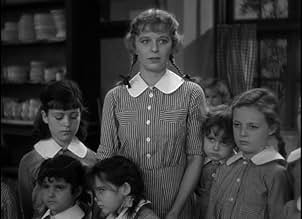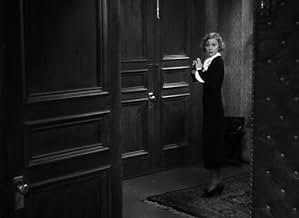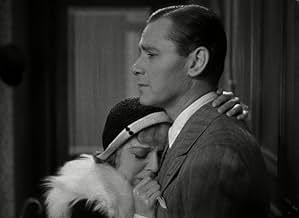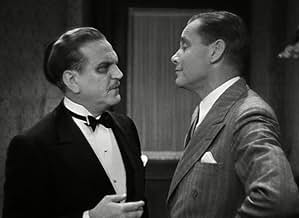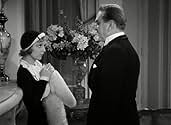AVALIAÇÃO DA IMDb
7,5/10
1,7 mil
SUA AVALIAÇÃO
Adicionar um enredo no seu idiomaA naive girl just out of a cloistered orphanage finds that being a 'good fairy' to strangers makes life awfully complicated.A naive girl just out of a cloistered orphanage finds that being a 'good fairy' to strangers makes life awfully complicated.A naive girl just out of a cloistered orphanage finds that being a 'good fairy' to strangers makes life awfully complicated.
- Direção
- Roteiristas
- Artistas
- Prêmios
- 2 vitórias no total
Ted Billings
- Shoeshine Man
- (não creditado)
Alene Carroll
- Schoolgirl in Orphanage
- (não creditado)
- Direção
- Roteiristas
- Elenco e equipe completos
- Produção, bilheteria e muito mais no IMDbPro
Avaliações em destaque
Circumstances afford a young woman an opportunity to enrich the life of a poor person that she picks randomly out of a telephone book. Sturges delightfully adapts a Hungarian play, incorporating the kind of snappy dialog that would mark his later directorial efforts. In one of three great films he directed in the mid 1930s (Counsellor at Law, Dodsworth), Wyler displays a touch comparable to Lubitsch. Sullavan, an actress whose career and life were both sadly short, is charming as a good-hearted orphan. Marshall is perfectly cast as a dignified lawyer. Laughs are provided by Owen as a waiter who wants to protect Sullavan and by Morgan as a tycoon who wants to be Sullavan's Sugar Daddy.
The story of a naif who goes out into the world, skirts calamity (i.e. seduction, in the guise of Frank Morgan, no less), and finds true love (Herbert Marshall, who likewise should be better remembered--he'd a been a bigger star if he would have been five years younger when the talkies started in earnest). Of course, Sullavan the naif is the one who instructs the world weary cosmopolitans rather than vice-versi.
The script, being by Preston Sturges, is funny and witty and artfully plotted. Sullavan was a great actress/star of the '30's early '40's who unfortunately is mostly forgotten now. She has a quality, a sly subtle acidity that makes her different from other screwball heroines. She also had the knack of bringing out the tenderness in her male leads (James Stewart was never more suave, articulate, and keenly perceptive than opposite the funny cruel little egomaniac Sullavan in The Shop Around the Corner, which is a masterpiece, and she brought out the early best in her former husband, Henry Fonda, in The Moon's Our Home, which is another forgotten little gem). It's not so much she's vicious a la Bette Davis or the divine Barbara Stanwyck: she's too minutely picky, petty really in getting what she wants, too self-centeredly rational in getting her way for that. But, anyway, The Good Fairy has a younger softer Sullavan. The supporting cast is superior, too.
The script, being by Preston Sturges, is funny and witty and artfully plotted. Sullavan was a great actress/star of the '30's early '40's who unfortunately is mostly forgotten now. She has a quality, a sly subtle acidity that makes her different from other screwball heroines. She also had the knack of bringing out the tenderness in her male leads (James Stewart was never more suave, articulate, and keenly perceptive than opposite the funny cruel little egomaniac Sullavan in The Shop Around the Corner, which is a masterpiece, and she brought out the early best in her former husband, Henry Fonda, in The Moon's Our Home, which is another forgotten little gem). It's not so much she's vicious a la Bette Davis or the divine Barbara Stanwyck: she's too minutely picky, petty really in getting what she wants, too self-centeredly rational in getting her way for that. But, anyway, The Good Fairy has a younger softer Sullavan. The supporting cast is superior, too.
Don't let the title or director give you the wrong idea; THE GOOD FAIRY is a snappy and sophisticated example of the kind of civilized lunacy for which screenwriter (and later director) Preston Sturges became so well-known. Yes, it's adapted from a Hungarian play, and yes, it's directed by William Wyler, but Sturges' creative influence is evident - even dominant - throughout. Though Wyler did make the occasional foray into lighter material ("Roman Holiday," "How To Steal a Million"), he's mostly associated with intelligent drama, and here one can almost sense idea man Sturges lurking just behind him, whispering, "Hey, Willie, how about this....?" There's so much about this picture that is prototypical of later Sturges classics such as "The Miracle of Morgan's Creek" and "Unfaithfully Yours." Indeed, THE GOOD FAIRY utilizes a plot device that was later modified for "The Palm Beach Story," wherein Claudette Colbert tries to get a millionaire to enrich her husband by pretending he's not her husband. Here, Margaret Sullavan tries to get a millionaire to enrich a complete stranger by pretending the stranger IS her husband. Only Sturges could make such near-insanity seem almost logical.
There's not much point in synopsizing the plot; it's rather like a benign little tornado that sweeps the characters - and the viewer - up with it; there's nothing to do but surrender and see where it will touch down next, and what happens when it does. Let it suffice to say that, if you're any kind of Sturges fan, you'll find the ride delightful.
It's no surprise that winsome Sullavan, blustery Reginald Owen and the eminently reliable Alan Hale handle the material so deftly, but even normally serious players such as Herbert Marshall and Beulah Bondi exhibit understated but devastating comedy chops. Special mention must be made of Eric Blore (whose tipsy descent of a brief flight of stairs is nothing short of a miniature comic ballet) and Frank Morgan, at his flustered best, giving a performance of such sustained energy and velocity that (as my viewing companion said) he must have had to lie down for a rest after every take. An odd little sidelight: quintessentially American players Sullavan and Morgan made exactly three pictures together, in two of which they played Hungarians (this one and "Shop Around The Corner"), with the story taking place in Budapest. (In the third - "The Mortal Storm" - they played Germans in a small Alpine town.) Just one of those curious bits of trivia.
As noted in other comments, this gem of a film is apparently little known or remembered. Perhaps its release on DVD will accord it the attention and praise it so richly deserves. Do yourself a huge favor and get your hands on it right away. I saw it just a week ago and am already looking forward to watching it again.
There's not much point in synopsizing the plot; it's rather like a benign little tornado that sweeps the characters - and the viewer - up with it; there's nothing to do but surrender and see where it will touch down next, and what happens when it does. Let it suffice to say that, if you're any kind of Sturges fan, you'll find the ride delightful.
It's no surprise that winsome Sullavan, blustery Reginald Owen and the eminently reliable Alan Hale handle the material so deftly, but even normally serious players such as Herbert Marshall and Beulah Bondi exhibit understated but devastating comedy chops. Special mention must be made of Eric Blore (whose tipsy descent of a brief flight of stairs is nothing short of a miniature comic ballet) and Frank Morgan, at his flustered best, giving a performance of such sustained energy and velocity that (as my viewing companion said) he must have had to lie down for a rest after every take. An odd little sidelight: quintessentially American players Sullavan and Morgan made exactly three pictures together, in two of which they played Hungarians (this one and "Shop Around The Corner"), with the story taking place in Budapest. (In the third - "The Mortal Storm" - they played Germans in a small Alpine town.) Just one of those curious bits of trivia.
As noted in other comments, this gem of a film is apparently little known or remembered. Perhaps its release on DVD will accord it the attention and praise it so richly deserves. Do yourself a huge favor and get your hands on it right away. I saw it just a week ago and am already looking forward to watching it again.
I am always amazed with the talent of Preston Sturgis. He is a true painter of WORDS, a tunesmith of dialog and staging. In this early William Wyler Universal film using Preston Sturgis screen play we have scene after scene of people acting and reacting off each other's follies which is a true documentation of this race we call Human. This film depicts the constant struggle to make sense of human interaction.
The nice thing is there is no murders, explosions, mayhem or outright evil. All these things get in the way of DIALOG. I watch this film in awe, there is musical rhythm in the first third of the film combining dialog, action and music. You will really like all these people at the end of the film.
Time Well Spent., No Noise
The nice thing is there is no murders, explosions, mayhem or outright evil. All these things get in the way of DIALOG. I watch this film in awe, there is musical rhythm in the first third of the film combining dialog, action and music. You will really like all these people at the end of the film.
Time Well Spent., No Noise
A very fine director (William Wyler), an excellent cast, and prestigious source material (a play by Ferenc Molnar), but this delightful screwball comedy has screenwriter Preston Sturges' fingerprints all over it, and Wyler's casual, unfussy direction feels like Sturges' when directing his own later masterpieces. Margaret Sullavan is the well-meaning orphan set out into the world who wants to do good deeds, and one such deed spirals out of control and brings dizzying repercussions. What Sturges does, as he often did, is set up an absurd situation and keep juggling, each ball just about to come crashing down but never quite hitting the floor. He invents funny lines for expert supporting farceurs and keeps the tempers high, and sends the dialog careening down unexpected alleyways. The contemporary Times critic didn't think Sullavan was a natural comedienne, but I beg to differ, and her whimsical quality is just right. Herbert Marshall, often annoying, is charming here, and Frank Morgan gets perhaps his best shot ever at a character he practically patented--the dithering dilettante, all false bravado and doubling-back-on-himself retractions. Its inconsequentiality is part of its appeal, and if you think it feels like a musical, you're not far off: Sturges later adapted his own screenplay as a Broadway vehicle for Nanette Fabray (good casting), but he botched the adaptation, and "Make a Wish" was an expensive flop. This one doesn't turn up too often, so catch it when you can, and revel in the early Sturges finding and perfecting his unique voice.
Você sabia?
- CuriosidadesMargaret Sullavan wanted control on the set of the movie, and did spiteful things to get her way. Script girl Freda Rosenblatt said: If she was tired and wanted to go home and Willy had one more scene to do, she would smear the makeup on her face. That would mean everything had to stop so she could be made up again. Which might take hours. So they couldn't shoot. Maggie got so bored between scenes she went behind one of the sets and purposely lay down on the dusty floor. The beautiful white dress she was wearing was a wreck. That stopped everything. -- Despite all this, she and Wyler fell in love and were married during the filming.
- ConexõesFeatured in WatchMojo: Top 10 Comedy Movies: 1930s (2014)
Principais escolhas
Faça login para avaliar e ver a lista de recomendações personalizadas
- How long is The Good Fairy?Fornecido pela Alexa
Detalhes
- Data de lançamento
- País de origem
- Idioma
- Também conhecido como
- The Good Fairy
- Locações de filme
- Empresa de produção
- Consulte mais créditos da empresa na IMDbPro
Bilheteria
- Faturamento bruto mundial
- US$ 7.478
- Tempo de duração1 hora 38 minutos
- Cor
- Proporção
- 1.37 : 1
Contribua para esta página
Sugerir uma alteração ou adicionar conteúdo ausente

Principal brecha
By what name was A Boa Fada (1935) officially released in Canada in English?
Responda
